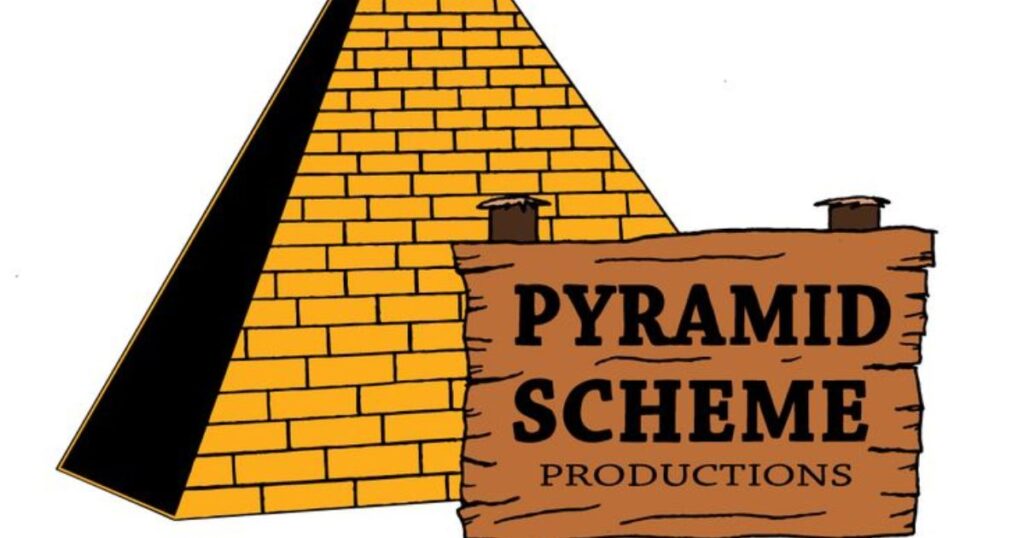In the ever-evolving landscape of multi-level marketing (MLM), few companies have garnered as much attention and controversy as Market America.
As we delve into the complex world of MLM legality on this May 18, 2024, we find ourselves examining a web of lawsuits, allegations, and heated debates surrounding this prominent player in the direct selling industry.
From cosmetics and jewelry to nutritional products and home goods, Market America’s diverse product lineup has been overshadowed by persistent accusations of operating as an illegal pyramid scheme. Let’s break down the intricate details of these allegations and explore the legal challenges faced by this contentious MLM giant.
What is a Pyramid Scheme?
Before we dive into the specifics of Market America’s legal troubles, it’s crucial to understand what constitutes a pyramid scheme and how it differs from legitimate MLM operations.
A pyramid scheme is a fraudulent business model that primarily generates revenue through the continuous recruitment of new members rather than the sale of actual products or services.
Key characteristics of pyramid schemes include:
- Emphasis on recruitment over product sales
- Promises of unrealistic returns on investment
- Complex compensation structures that favor early entrants
- Mandatory purchase of expensive starter kits or inventory
- Lack of genuine retail customer base
In contrast, legitimate MLMs focus on selling real products to end consumers, with recruitment serving as a secondary aspect of their business model.
The line between the two can often blur, leading to intense scrutiny from regulatory bodies like the Federal Trade Commission (FTC) and state attorneys general.
Market America’s Business Model Scrutinized

Market America’s Business Model Scrutinized
Market America, founded in 1992, positions itself as a “product brokerage and internet marketing company” that offers a diverse range of products through its “UnFranchise” business model.
This unique approach allows individuals to become “UnFranchise Owners” who can sell Market America’s products while also earning commissions and bonuses for recruiting others into the system.
The company’s compensation plan is multi-tiered and complex, involving various bonuses and incentives tied to both personal sales and the performance of one’s downline. Critics argue that this structure places an undue emphasis on recruitment, potentially crossing the line into pyramid scheme territory.
The Inventory Loading Issue
One of the most contentious aspects of Market America’s business practices is the alleged pressure on distributors to purchase large amounts of inventory upfront. This practice, known as “inventory loading,” has been a focal point in several lawsuits against the company.
Plaintiffs claim that UnFranchise Owners are encouraged or required to make substantial initial investments in product inventory, often running into thousands of dollars. The alleged rationale behind this is to ensure distributors have products on hand to sell.
However, critics argue that this practice is primarily designed to generate revenue for the company and upline members through recruitment rather than meeting genuine market demand.
Read this Post: Prodigy Promos Lawsuit: Controversy of Legal Battle
Federal Pyramid Scheme Lawsuit Against Market America
In a groundbreaking move, the Federal Trade Commission (FTC) filed a lawsuit against Market America in 2019, alleging that the company was operating as an illegal pyramid scheme.
The complaint also accused Market America of targeting Chinese immigrant communities with deceptive marketing practices.
Key allegations in the FTC lawsuit include:
- Prioritizing recruitment over retail sales
- Operating an unsustainable business model
- Making false or misleading income claims
- Violating the Racketeer Influenced and Corrupt Organizations (RICO) Act
- Breaching California state laws
The FTC’s involvement marked a significant escalation in the legal challenges faced by Market America, potentially setting a precedent for how MLMs are regulated in the United States.
Incentivizing Endless Recruitment Over Sales?

Incentivizing Endless Recruitment Over Sales?
At the heart of the pyramid scheme allegations is the accusation that Market America’s compensation structure inherently incentivizes recruitment over genuine retail sales.
Critics point to the company’s complex bonus system, which they claim allows top-level distributors to earn substantial incomes primarily through the recruitment and purchases of those beneath them in the organizational structure.
A particularly damning statistic cited in court documents suggests that over 90% of Market America distributors lose money. This figure, if accurate, raises serious questions about the sustainability and fairness of the company’s business model.
Additional Lawsuits and Legal Troubles
The FTC’s lawsuit is far from Market America’s only legal battle. The company has faced a series of legal challenges over the years, including:
- Massachusetts Lawsuit (2016): The state of Massachusetts sued Market America for allegedly operating a pyramid scheme and targeting residents with deceptive marketing practices.
- SEC Charges (1999): Market America paid a $300,000 settlement to resolve Securities and Exchange Commission (SEC) charges related to false and misleading statements in their stock offerings.
- Individual Lawsuits: Numerous distributors have filed lawsuits against the company, claiming unpaid commissions, deceptive practices, and failure to deliver on promised earnings potential.
This pattern of legal challenges spanning over two decades has cast a long shadow over Market America’s operations and reputation within the MLM industry.
Market America’s Defense and MLM Industry Response
In response to these allegations, Market America has vigorously defended its business practices. The company maintains that it operates a legitimate MLM focused on product sales rather than recruitment.
Market America argues that its compensation plan rewards sales activity and that successful distributors demonstrate the viability of their business model.
Key points in Market America’s defense include:
- Emphasis on the quality and diversity of their product offerings
- Testimonials from successful UnFranchise Owners
- Claims that inventory purchases are for personal consumption, not just for resale
- Assertions that their business model complies with all relevant laws and regulations
The broader MLM industry has watched these legal battles with keen interest. While some companies have distanced themselves from the controversy, others argue that overzealous regulators misunderstand the nature of direct selling business models.
Signs a Company May Be an Illegal Pyramid Scheme

Signs a Company May Be an Illegal Pyramid Scheme
As consumers and potential distributors navigate the complex world of MLMs, it’s crucial to be aware of red flags that may indicate a company is operating as an illegal pyramid scheme. Here’s a checklist to help identify potential warning signs:
🚩 Red Flag Checklist for Pyramid Schemes
- Emphasis on recruitment over product sales
- Promises of quick and easy wealth
- Pressure to invest in large amounts of inventory
- Complex and opaque compensation plans
- Little to no focus on retail customers
- High-pressure recruitment tactics
- Mandatory purchase of expensive training materials or tools
- Lack of legitimate products or services
- Unsustainable business model relying on continuous recruitment
- History of legal troubles or regulatory actions
By being vigilant and critically evaluating MLM opportunities using this checklist, individuals can better protect themselves from potentially fraudulent schemes.
Recommended Post: חשבונית ירוקה Icount – A Green Solution For Digital Invoicing
Conclusion: Navigating the MLM Legitimacy Debate
As we reflect on the ongoing legal battles surrounding Market America and the broader implications for the MLM industry, it’s clear that the line between legitimate direct selling and illegal pyramid schemes remains contentious. The outcome of the FTC’s lawsuit against Market America could have far-reaching consequences, potentially reshaping the regulatory landscape for MLMs in the United States.
For consumers and potential distributors, the key takeaway is the importance of due diligence. Before engaging with any MLM opportunity, thorough research, critical evaluation of income claims, and a clear understanding of the business model are essential.
As the legal proceedings unfold, the future of Market America and similar MLM companies hangs in the balance. Regardless of the outcome, these cases serve as a stark reminder of the need for transparency, ethical business practices, and robust consumer protection in the world of multi-level marketing.
Whether Market America will emerge from these legal challenges as a vindicated legitimate business or face the consequences of operating an alleged pyramid scheme remains to be seen. What is certain, however, is that these lawsuits have sparked a crucial dialogue about the nature of MLMs and the fine line between opportunity and exploitation in the direct selling industry.

Hello, I’m Henry, a committed writer at supersbusiness.com, where I specialize in Business, Finance, Real Estate, and News. My articles explore a wide range of topics, providing readers with insightful and engaging content. With a knack for simplifying complex ideas, I aim to make my writing accessible and informative for all. Stay informed on the latest trends and insights by following me on supersbusiness.com.

